

In-Focus: Excellence in Leadership Development: Energising Leaders Through Technology. Brought to you through the support of our Ambassador KPMG, Excellence in Leadership Development aims to provide independent evidence that will help organisations understand the role of technology in leadership development and how to improve the impact of learning innovation.
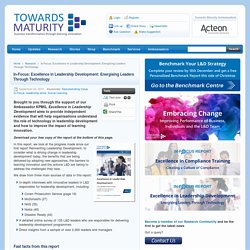
Download your free copy of the report at the bottom of this page. In this report, we look at the progress made since our first report Reinventing Leadership Development, to consider what is driving change in leadership development today, the benefits that are being delivered by adopting new approaches, the barriers to learning innovation and the actions L&D are taking to address the challenges they face.
We draw from three main sources of data in this report: Leaders as self-directed learners Data from 2,000 leaders and managers highlights that whilst 40% find their classroom experiences essential or very useful in helping them do their job, they are also strong self-directed learners: Acknowledgements Related downloads. Learn, rest, repeat. Learn, rest, repeat. Singapore leads the way for workplace skills. I'll tell you something: Andy Lancaster.
Reaching the ship's crews cut off from learning. Image copyright Thinkstock If you were to think about bringing distance learning to a place with only patchy internet and where people were away from home for two weeks at a time, you might not immediately think of a cross-channel ferry.
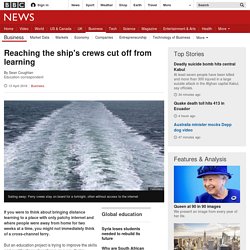
But an education project is trying to improve the skills and qualifications of seafarers, in a way that is compatible with this floating workplace. For any of us who have used ferries, it's often a rather insulated experience - less boat and more mobile tunnel or maritime service station. Most people don’t have any potential. THE majority of people are already doing things as well as they can, it has emerged.
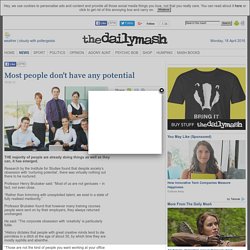
Research by the Institute for Studies found that despite society’s obsession with ‘nurturing potential’, there was virtually nothing out there to be nurtured. Professor Henry Brubaker said: “Most of us are not geniuses – in fact, not even close. “Rather than brimming with unexploited talent, we exist in a state of fully realised mediocrity.” Professor Brubaker found that however many training courses people were sent on by their employers, they always returned unchanged. Learning Impact: A Progress Update.
Making an impact with learning and development has been the bedrock of our research programme since 2003.
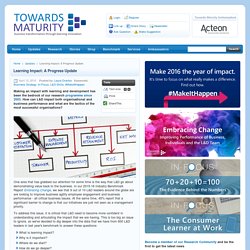
How can L&D impact both organisational and business performance and what are the tactics of the most successful organisations? One area that has grabbed our attention for some time is the way that L&D go about demonstrating value back to the business. In our 2015-16 Industry Benchmark Report Embracing Change, we see that 9 out of 10 L&D leaders around the globe are are looking to improve business agility employee engagement and business performance - all critical business issues. At the same time, 45% report that a significant barrier to change is that our initiatives are just not seen as a management priority. In-Focus: Learning and Performance on the Move (2016) The In-Focus Report: Learning and Performance on the Move is available to download at the bottom of this page, thanks to the support of Redware.
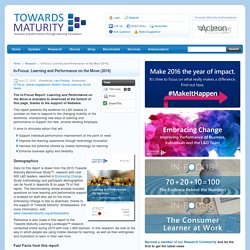
This report presents the evidence for L&D leaders to consider on how to respond to the changing mobility of the workforce, championing new ways of learning and performance to support the new, smarter-working employee. It aims to stimulate action that will: Support individual performance improvement at the point of needImprove the learning experience through technology innovationHarness the potential offered by mobile technology for learningEnhance business agility and flexibility. L&D: evolving roles, enhancing skills - Research Reports. What you already know is the key to learning new things. Imagine how much you already know.

Just contemplate everything you have learned and experienced during all the years that you have been alive. Everything. Seems pretty vast, doesn’t it? Your brain is full of knowledge gathered throughout your lifetime. How to avoid 'death by PowerPoint' Real Learning. Tor Norretranders, The User Illusion, Cutting Consciousness Down to Size (Penguin, 1999).
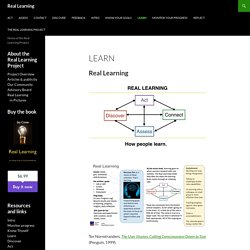
“Pray, Mr. Babbage.”Charles Baggage, Passages from the Life of a Philosopher (Longman and Co., 1864). “Learning is fundamentally a conversation.” Roger Schank, Education Outrage Blog. “Neurons that fire together, wire together.” Canadian neuropsychologist Donald Hebb came up with the concept in 1949. Karen Stephenson, What Knowledge Tears Apart, Networks Make Whole. Spaced repetition: a hack to make your brain store information. Late night dates with a 600-page textbook and a multipack of Red Bull are a familiar encounter for many people.
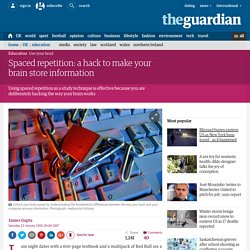
Whether in school, university or work, we all find ourselves in situations where we have to learn a vast quantity of information in a very short period of time. In these instances, almost all of us resort to the age-old study technique of reading through the textbook over and over again in the hope that some of it will stick. However, this study technique is not only tedious and repetitive, it’s also ineffective. It is completely misaligned with how our brains actually work, according to basic neuroscience and psychology research. Fortunately, that same research paves the way for alternative study methods which work with, rather than against, our brain.
Towards Maturity. 70:20:10’s challenges: new thinking; new roles. It's not about the numbers.
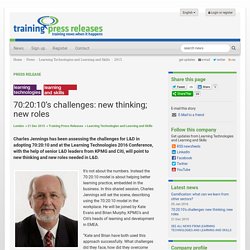
Instead the 70:20:10 model is about helping better learning practice, embedded in the business. In this shared session, Charles Jennings will set the scene, describing using the 70:20:10 model in the workplace. He will be joined by Kate Evans and Brian Murphy, KPMG’s and Citi’s heads of learning and development in EMEA. “Kate and Brian have both used this approach successfully. Five lessons for the future of L&D.